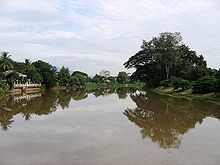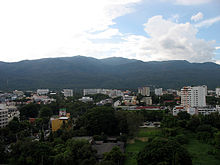Chiang Mai
![]()
This article is about the city; for the television film from the series The Dream Hotel, see The Dream Hotel - Chiang Mai.
Chiang Mai (also Chiengmai, Xiang Mai or Kiangmai, (tʃæŋˈmaɪ, from เชียงใหม่ tɕʰīəŋ màj, ![]() , Lanna: ᨩ᩠ᨿᨦ ᩲᩉ᩠ᨾ᩵ t͡ɕīəŋ.màj)) is a major city (เทศบาลนครเชียงใหม่) in the Thai province of Chiang Mai. It is the capital of Mueang Chiang Mai County (amphoe) and the capital of Chiang Mai Province. With a population of 135,757, it is the largest and most culturally important city in the northern region of Thailand and is also called Rose of the North because of its scenic beauty.
, Lanna: ᨩ᩠ᨿᨦ ᩲᩉ᩠ᨾ᩵ t͡ɕīəŋ.màj)) is a major city (เทศบาลนครเชียงใหม่) in the Thai province of Chiang Mai. It is the capital of Mueang Chiang Mai County (amphoe) and the capital of Chiang Mai Province. With a population of 135,757, it is the largest and most culturally important city in the northern region of Thailand and is also called Rose of the North because of its scenic beauty.
Location
The village is situated in a wind-protected river valley of the Mae Nam Ping, at the foot of the mountain Doi Pui (1685 m above sea level).
The provincial capital is the economic and cultural centre of the north. The former tranquility has given way to a western bustle, many old teak houses have been replaced by concrete buildings. This makes the enormous contrast to the members of the hill tribes (among others Akha, Meo, Lisu, Karen) settling outside the city in a traditional way abundantly clear.
There are about 200 Buddhist temples (Wat), many of which are located in the old town. This is enclosed by a square of the ancient city wall (remains of which are still preserved) and a moat running parallel to it, which can be crossed on numerous bridges. The centre of the modern city, on the other hand, lies to the east outside the former city walls towards the banks of the Mae Nam Ping.
Economy
Chiang Mai is the center of Thai arts and crafts. In particular, wood processing, textile manufacturing and the processing of jade jewelry are important branches of the economy. Chinnaraje, a manufacturer of autorickshaws (tuk-tuk), had its headquarters in the city. Besides, tourism is an important source of livelihood for many people.

The Ping River in Chiang Mai

View of Doi Pui and Doi Suthep
Search within the encyclopedia